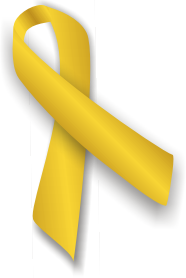Pediatric Cancer Awareness

October 3, 2019
The month of September is dedicated to Pediatric Cancer Awareness. Cancer is a disease identifiable by the division of abnormal cells in the body. Childhood cancer is not just one disease and can begin in any part of the body. There are various forms of pediatric cancer ranging from leukemia, neuroblastoma, and more. There is no definitive cure for cancer as a whole.
Childhood cancer rates are increasing throughout the years. In 2007, 10,400 adolescents were diagnosed with cancer and 15% of those children were expected to die. Roughly, 1 in 5,000 children will be diagnosed annually. About 11,060 children in the United States under the same age range will be diagnosed with some form of pediatric cancer this year. Cancer is the second leading cause of death after accidents. In 2019, 1,190 children under 15 are expected to die from pediatric cancer. Most children with cancer would cancer mid-1970s had a 58% chance of survival past 5 years. Due to advances in cancer treatment, more than 80% of children diagnosed with cancer survive 5 years or more. Though, treatments have negative side effects.
Pediatric cancer has lifelong effects on a child such as cognitive impairment. Many survivors face cognitive change as a side effect of cancer and/or the treatments that are administered to them. Risk factors for cognitive impairment in children include: genetic factors, sex, age, chemotherapy and radiation dose. Tumor type, therapy quality, and inflammation increase the likelihood of cognitive impairment. During treatment, up to 80% of patients reported cognitive issues. Younger female patients have a greater chance of experiencing neurocognitive and academic declines. However, research studies imply that cognitive, behavioral, and pharmaceutical approaches may help.
The neurocognitive effects of pediatric cancer treatment adversely impact the academic performance of childhood cancer survivors through decreased functioning in the following aspects: processing speed, memory, ability to learn, and executive functioning. Clinicians and researchers are still trying to find ways to decrease the negative impacts through studying the effect of cancer and cancer treatments on survivor’s lives. The outcome of how to neurocognitive function is affected involves multitudinous factors that interact in a complex, unpredictable manner. Thus, researchers have not found a solution for the cognitive impairment children experience post cancer treatment.
Families are affected in multitudinous ways. Every 3 minutes, a family is informed that their child has cancer. Each family copes with the news in various ways, some common initial responses include: shock, denial, fear, sadness, guilt, and anger. The diagnosis and treatment is a stressful time for all family members. Many kids feel guilt, holding the belief that the cancer was their own fault. Compared to healthy children, kids diagnosed with cancer experience decreased emotional, social, and physical quality of life. Analyses have shown that siblings of children with cancer have increased risk of depression, anxiety, and poor peer relationships. 2 years after a child finishes cancer treatment, a sibling’s emotional and social issues persist. A child being diagnosed with cancer can be overwhelming for any family.
Pediatric cancer is an everyday reality for families around the world. Increasing public knowledge for this disease is important as it helps families and children have more support during their harsh battles against cancer.